(外研社)新标准大学英语1 汉译英答案
新标准大学英语第一单元,课文翻译,短语,答案
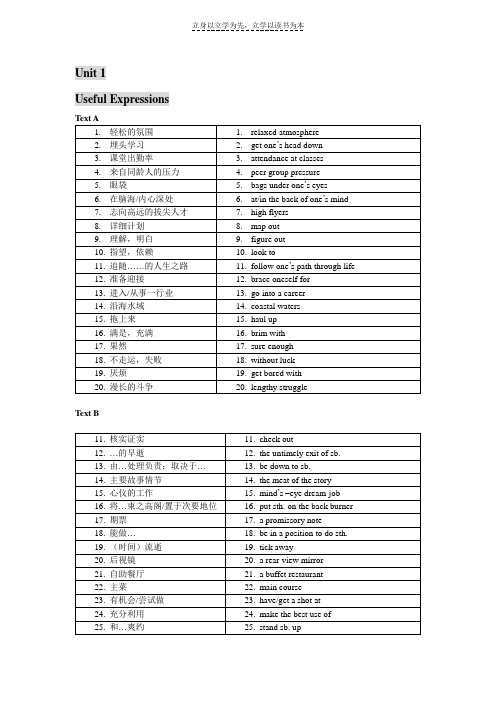
Unit 1Useful ExpressionsText BKeys to ExercisesText A3. 34. b, c, c, d, c, a5. productive, attendance, resistance, ambitious, acceptance, script, impressive6. attendance, ambitious, productive, impressive, resistance, script, acceptance7. mortgage, deck, surf, coastal, defy, lengthy8. b, a, b, b, a, a, b, bText B2. c, d, b3. 34. triple, cemetery, rear, biography, cram, budding, finite, elapse5. elapsed, cemetery, rear, crammed, triple, budding, biography, finite6. a, b, a, a, b, b, a, a7. a, b, b, a, a, b, b, b, aLanguage in use1. • I’ve double- and triple-checked it. (compound verb)• budding crypt-kickers (compound noun)• a rear-view mirror (compound adjective)• the once-a-year holiday to Florida or Spain (compound adjective)• back-burner stuff (compound adjective)• standing at the corner of the Co-op (compound noun)• a sepia-coloured relative that no one can put a name to (compound adjective)2. a late-night party, a well-stocked library, a world-famous professor, some well-timedadvice, a rapidly-growing population, a free-market economy, a half-hour boat trip3. It’s how we behave that determines what other people think of us.It’s what our character is that usually determines what sort of job we are going to end up doing. It isn’t always what ma rks we get at university that determines what we do as a career.It is often what we experienced in our childhood that determines how we react to life’s problems.It’s what our genetic clock is and what changes we make to it that determine when we die.4. It wasn’t just that the shops were all closed for Thanksgiving, but there was no one in thestreets.It wasn’t just that she spent all her time at college going to pa rties, but she took the time togaina first class degree.It wasn’t just that they weren’t listening to what he said, but it seemed as if they weren’t at all interested.It wasn’t just that I was upset, but I felt as if I was going to burst out crying.It wasn’t just that the Grim Reaper was intended to frighten people, but it was also a figure of fun.6. 我们都觉得在校时间不多了,以后再也不会有这样的学习机会了,所以都下定决心不再虚度光阴。
新标准大学英语一,英语课后翻译答案共40页

31、只有永远躺在泥坑里的人,才不会再掉进坑里。——黑格尔 32、希望的灯一旦熄灭,生活刹那间变成了一片黑暗。——普列姆昌德 33、希望是人生的乳母。——科策布 34、形成天才的决定因素应该是勤奋。——郭沫若 35、学到很多东西的诀窍,就是一语一,英语 课后翻译答案
6、纪律是自由的第一条件。——黑格 尔 7、纪律是集体的面貌,集体的声音, 集体的 动作, 集体的 表情, 集体的 信念。 ——马 卡连柯
8、我们现在必须完全保持党的纪律, 否则一 切都会 陷入污 泥中。 ——马 克思 9、学校没有纪律便如磨坊没有水。— —夸美 纽斯
新标准大学英语1课后翻译

新标准大学英语1课后翻译Unit 1 Friendship。
Part I。
1. 我有一个好朋友,她叫玛丽。
她是一个非常聪明和有趣的女孩。
I have a good friend, her name is Mary. She is a very smart and interesting girl.2. 我们经常一起上学,一起吃午饭,一起做作业。
We often go to school together, have lunch together, and do homework together.3. 玛丽是一个很好的倾听者,她总是在我需要的时候给我建议。
Mary is a good listener, she always gives me advice when I need it.4. 我们经常分享彼此的快乐和痛苦,这让我们的友谊更加牢固。
We often share our joys and sorrows, which makes our friendship stronger.5. 有时候我们也会有争吵,但是我们总是很快就和好了。
Sometimes we argue, but we always make up quickly.Part II。
1. 我们的友谊是建立在信任和理解的基础上的。
Our friendship is based on trust and understanding.2. 无论发生什么事情,我们都会互相支持和鼓励。
No matter what happens, we always support and encourage each other.3. 我相信这样的友谊会一直持续下去。
I believe that this kind of friendship will last forever.4. 我们经常一起度过美好的时光,这让我们的大学生活变得更加丰富多彩。
新标准大学英语综合教程1课后翻译答案
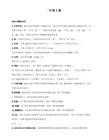
This femous sicienst will lecture at Peking University on global climate change and pubilc policy.
4 鲍勃需要控制自己,不能贪玩和浪费机会了。
2 在大城市里生活一段时间以后,他发现自己已经很难再适应乡村生活了。
After living in a big city for a whlie ,he found that it was hard for him to be conditioned to a rural life again.
3 他渐渐意识到没有人能够对这件事做出一个令人信服的解释。
It gradually dawned on him that no one would come up with a convincing explanation this incident.
4 人们想当然的认为苦干有助于成功。
It is taken for granted that hard work contributes to success.
新标准大学英语汉译英
6)
1 一定要先确认把邮票贴牢了,再把信封投到信箱。
Make sure the stamp is firmly attached to the letter before you drop it into the maxbox.
2 很多青少年痴迷网络游戏,这会对他们的身心健康造成损害。
5 他以专心从事慈善事业而闻名。
He distingushes himself by committing himself to doing in 带来的巨大威胁。
新标准大学英语综合教程1答案及全文翻译第5单元
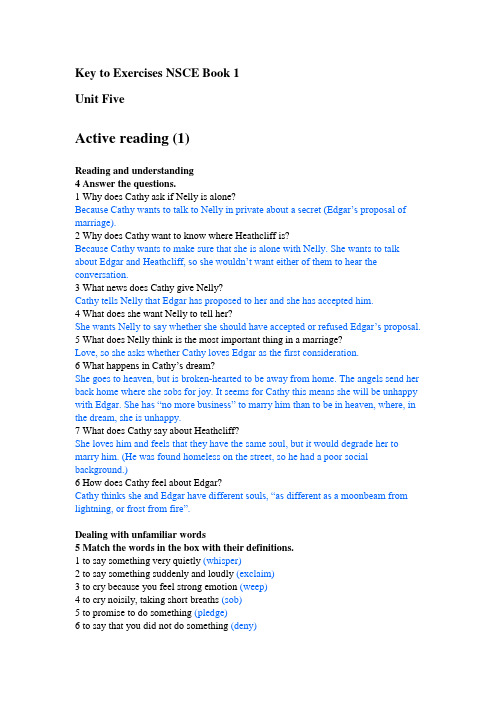
Key to Exercises NSCE Book 1Unit FiveActive reading (1)Reading and understanding4 Answer the questions.1 Why does Cathy ask if Nelly is alone?Because Cathy wants to talk to Nelly in private about a secret (Edgar’s proposal of marriage).2 Why does Cathy want to know where Heathcliff is?Because Cathy wants to make sure that she is alone with Nelly. She wants to talk about Edgar and Heathcliff, so she wouldn’t want either of them to hear the conversation.3 What news does Cathy give Nelly?Cathy tells Nelly that Edgar has proposed to her and she has accepted him.4 What does she want Nelly to tell her?She wants Nelly to say whether she should have accepted or refused Edgar’s proposal.5 What does Nelly think is the most important thing in a marriage?Love, so she asks whether Cathy loves Edgar as the first consideration.6 What happens in Cathy’s dream?She goes to heaven, but is broken-hearted to be away from home. The angels send her back home where she sobs for joy. It seems for Cathy this means she will be unhappy with Edgar. She has “no more business” to marry him than to be in heaven, where, in the dream, she is unhappy.7 What does Cathy say about Heathcliff?She loves him and feels that they have the same soul, but it would degrade her to marry him. (He was found homeless on the street, so he had a poor social background.)6 How does Cathy feel about Edgar?Cathy thinks she and Edgar have different souls, “as different as a moonbeam from lightning, or frost from fire”.Dealing with unfamiliar words5 Match the words in the box with their definitions.1 to say something very quietly (whisper)2 to say something suddenly and loudly (exclaim)3 to cry because you feel strong emotion (weep)4 to cry noisily, taking short breaths (sob)5 to promise to do something (pledge)6 to say that you did not do something (deny)7 to stop someone from doing something, like speaking (interrupt)8 to start something again, like speaking (resume)9 to breathe out slowly, especially because you are sad (sigh)10 to say the opposite of what someone has said is true (contradict)Now check (¸) the reporting verbs which give most information about emotions. exclaim, weep, sob, pledge, sigh, contradict6 Replace the underlined words with the correct form of the words in the box.1 He was resting with his knees on the ground beside her when he asked her to marry him. (kneeling)2 It was traditional to ask for the father’s permission to marry the daughter. (consent)3 Her feelings towards him became different as she got to know him better. (altered)4 He continued with his argument, even though she didn’t agree with him. (pursued)5 Her refusal to admit what had happened made him get angry. (denial)6 He came home in a terrible mood and threw his bag onto the floor. (temper; flung)7 Answer the questions about the words and expressions.1 When you rock a baby, do you move it backwards and forwards (a) gently, or (b) violently?2 If you are having a doze, are you (a) asleep, or (b) working?3 If someone’s behaviour is shameful, should they (a) be proud of what they have done, or (b) feel very sorry about what they have done?4 If you aren’t worried about anything, save your own concerns, does this mean (a) you don’t have to be worried, or (b) you’re only worried about your own business?5 If you do something sulkily, will people notice that you are in (a) a good mood, or (b)a bad mood?6 Is a look which turns off someone’s bad temper likely to be (a) gentle, or (b) angry?7 If you come to the point, do you (a) come to the end of something, or (b) say what is important?8 If something is no business of yours, should you (a) be interested in it, or (b) not be interested in it?9 If something degrades someone, does it make people respect them (a) less, or (b) more?10 Does “What good is it doing something?” mean (a) “Why do it?”, or (b) “Is it a good thing to do?”Active reading (2)Dealing with unfamiliar words4 Match the words in the box with their definitions.1 a strong feeling of sadness (grief)2 a round shape or curve (loop)3 an image that you see when you look in a mirror (reflection)4 to let something fall off as part of a natural process (shed)5 a smooth and beautiful way of moving (grace)6 attractive (cute)7 continuing to support someone or be their friend (faithful)8 to cover something by putting something such as paper or cloth around it (wrap)9 not bright (dim)5 Complete the sentences with the correct form of the words in Activity 4.1 I’ve been faithful to my husband all my life.2 I’d like to give this as a present. Could you wrap it for me in silver paper, please?3 The public expression of grief after the death of the princess lasted for several days.4 She dances with such grace! I think she could become a professional dancer.5 I can’t see very well in here. The light’s rather dim.6 When I saw my reflection in the mirror this morning I got a shock.6 Answer the questions about the words.1 Does a bill refer to (a) a bird’s mouth, or (b) a request for money in the poem?2 Is satin (a) a soft delicate material, or (b) a hard rough material?3 If something is wobbling, is it (a) not moving, or (b) moving unsteadily?4 Does platinum refer to (a) a colour like silver, or (b) a colour like gold?5 Is something that is lethal (a) very friendly, or (b) extremely dangerous?6 If a cloth has been embroidered, is it likely to be (a) multi-coloured, or (b) uncoloured?Language in Usewhatever, whoever etc1 Rewrite the sentences with the word in brackets.1 I don’t know who wrote this poem, but he was very romantic. (whoever) Whoever wrote this poem was very romantic.2 Heathcliff may be anywhere, but he isn’t in the house. (wherever)Wherever Heathcliff may be, he isn’t in the house.3 I don’t know what to say, because she doesn’t listen to me any more. (whatever) Whatever I say, she doesn’t listen to me anymore.4 Every time I told him a secret, he told his friends. (whenever)Whenever I told him a secret, he told his friends.5 Anything may happen, but I will always be faithful. (whatever)Whatever happens, I will always be faithful.6 I don’t know who sent me this parcel, but they know I like chocolates. (whoever) Whoever sent me this parcel knows I like chocolates.7 I’m not exactly sure what I’m eating, but it’s very nice. (whatever)Whatever I’m eating, it’s ve ry nice.8 You may end up anywhere in the world, but I will never forget you. (wherever)Wherever you end up in the world, I will never forget you.present participles2 Rewrite the sentences.1 Since I felt concerned, I asked her to phone me the next day.I, feeling concerned, asked her to phone me the next day.2 When Judith fell asleep she was clinging to her teddy bear.Judith fell asleep, clinging to her teddy bear.3 Sarah dried her eyes and tried to smile.Sarah, drying her eyes, tried to smile.4 H e took out the card and said, “This valentine’s for me.”“This valentine’s for me,” he said, taking out the card.5 I was waiting for the train when I read that poem.I waited for the train, reading that poem.6 Since I didn’t have much money with me, I couldn’t pay for the meal.I, not having much money with me, couldn’t pay for the meal.no more … than3 Look at the sentence and answer the question.I’ve no more business to marry Edgar Linton than I have to be in heaven.Cathy means that (c) .(a) if she marries Edgar Linton she will feel as if she’s in heaven(b) she won’t go to heaven if she married Edgar Linton(c) she doesn’t want to marry Edgar Linton and doesn’t feel she should be in heaven4 Rewrite the sentences using no more … than .1 I have no reason to get married, and I’ve got no reason to change my job.I have no more reason to get married than (I have) to change my job.2 She’s got no reason to feel unhappy, and no reason to celebrate.She’s got no more reason to feel unhappy than (she has) to celebrate.3 There’s no point in waiting here, and no point in calling a taxi.There’s no more point in waiting here than (there is) in calling a taxi.4 We have no interest in starting this task, or in finishing the first one.We have no more interest in starting this task than (we have) in finishing the first one.5 I’ve got no business to advise her about her private life, nor should she advise me about mine.I’ve got no more business to advise her about her private life than she has to advise me about mine.6 I have no wish to start a new relationship, or to write another book.I have no more wish to start a new relationship than (I have) to write another book. collocations5 Read the explanation of the words. Answer the questions.1 pursue To pursue means to follow a course of activity.(a) If you pursue the matter, you are likely to try to reach a decision (you don’t abandon it).(b) When you pursue your career, you have the career you want and you want to get ahead in it.(c) If the police are pursuing their inquiries, they haven’t solved the crime, and are still investigating it.2 denial A denial is a statement that something did not happen or isn’t true.(a) If you’re in denial about your age, you don’t admit how old you are.(b) If a company issues a strong denial of responsibility, they don’t admit to having done anything wrong.3 temper If you have a temper, you tend to get angry very quickly.(a) When tempers flare, people get angry.(b) If someone tells you to keep your temper during a discussion, they are likely to be telling you to calm down, and you shouldn’t lose your temper.(c) If people fly into a temper, they lose their temper very quickly and get really angry.4 wrap To wrap something is to cover something in cloth or paper.(a) If you wrap up a meeting, you finish it (because wrapping up a package is the last stage of preparing a gift or buying something).(b) If you’re wrapped up in your work, it interests you very much, and you spend a lot of time doing it or thinking about it, s o you don’t notice anything else.(c) If you keep something under wraps, you keep it secret (as if it is a package wrapped up so other people can’t see what it is).6 Translate the sentences into Chinese.1 Her lips were half asunder as if she meant to speak; and she drew a deep breath, but it escaped in a sigh, instead of a sentence.她半张着嘴,似乎想说什么;她深深地吸了一口气,可随之而来的却是一声无语的叹息。
外研社新标准大学英语综合教程翻译答案

课后翻译答案Unit11 对于是否应该在大学期间详细规划自己的未来,学生们意见不一。
有的人认为对未来应该有一个明确的目对于是否应该在大学期间详细规划自己的未来,学生们意见不一。
标和详细的计划,为日后可能遇到的挑战做好充分的准备;有的人则认为不用过多考虑未来,标和详细的计划,为日后可能遇到的挑战做好充分的准备;有的人则认为不用过多考虑未来,因为未来难以预料。
预料。
(map out; brace oneself for; uncertainty)Students differ about whether they should have their future mapped out when they are still at university. Some think they should have a definite goal and detailed plan, so as to brace themselves for any challenges, whereas some others think they don’t have to think much about the future, because future is full of uncertainties.2 经过仔细检查,这位科学家得知自己患了绝症。
虽然知道自己将不久于人世,他并没有抱怨命运的不公,经过仔细检查,这位科学家得知自己患了绝症。
虽然知道自己将不久于人世,他并没有抱怨命运的不公,己患了绝症而是准备好好利用剩下的日子,争取加速推进由他和同事们共同发起的那个研究项目,以提前结项。
( tick away; make the best of; have a shot at)After a very careful check-up, the scientist was told he had got a fatal disease. Although he knew that his life was ticking away, instead of complaining about the fate, the scientist decided to make the best of the remaining days, and speed up the research project he and his colleagues initiated, and have a shot at completing it ahead of schedule.Unit21 在火车站上,有一位老人给我讲述了他参加解放战争的经历,那些战斗故事对我有着极大的吸引力。
新标准大学英语1答案
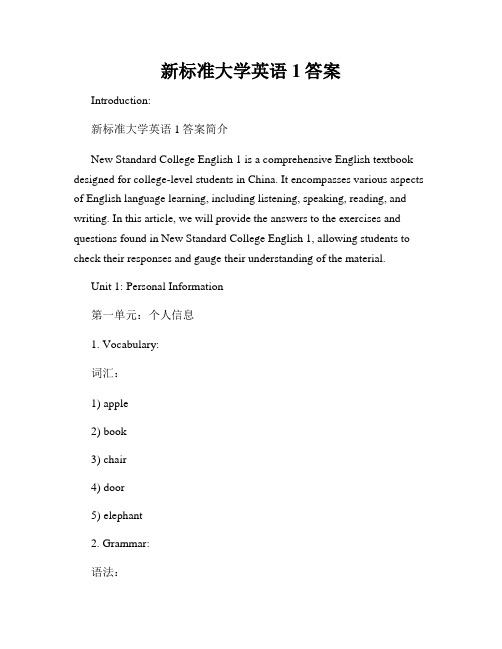
新标准大学英语1答案Introduction:新标准大学英语1答案简介New Standard College English 1 is a comprehensive English textbook designed for college-level students in China. It encompasses various aspects of English language learning, including listening, speaking, reading, and writing. In this article, we will provide the answers to the exercises and questions found in New Standard College English 1, allowing students to check their responses and gauge their understanding of the material.Unit 1: Personal Information第一单元:个人信息1. Vocabulary:词汇:1) apple2) book3) chair4) door5) elephant2. Grammar:语法:1) He is a student.2) She is my sister.3) They are teachers.4) We are friends.5) I am an engineer.3. Listening:听力:1) B2) A3) C4) B5) CUnit 2: Daily Life第二单元:日常生活1. Vocabulary:词汇:1) breakfast2) lunch3) dinner5) vegetables2. Grammar:语法:1) I wake up at 7:00 am every day.2) She brushes her teeth before going to bed.3) They have lunch at 12:30 pm.4) We go to the gym in the evening.5) He reads a book before sleeping.3. Listening:听力:1) C2) B3) A4) A5) BUnit 3: Leisure Activities第三单元:休闲活动1. Vocabulary:1) swimming2) dancing3) painting4) hiking5) cooking2. Grammar:语法:1) She enjoys swimming in the pool.2) They like dancing at parties.3) He loves painting landscapes.4) We go hiking in the mountains.5) I enjoy cooking Italian cuisine. 3. Listening:听力:1) B2) C3) A4) BUnit 4: Travel第四单元:旅行1. Vocabulary:词汇:1) airplane2) hotel3) passport4) suitcase5) destination2. Grammar:语法:1) I am going to Europe next month.2) She will stay at a five-star hotel.3) They have their passports ready.4) We need to pack our suitcases.5) He is excited to explore a new destination.3. Listening:听力:2) A3) B4) B5) AConclusion:结论This article has provided the answers to exercises and questions found in the first four units of New Standard College English 1. By referring to this article, students can check their responses and assess their progress in learning English. Remember to practice regularly and utilize the accompanying materials provided by the textbook to further enhance your language skills. Good luck with your English language learning journey!。
新标准大学英语(第二版)综合教程1答案截图及课文翻译(完整版)
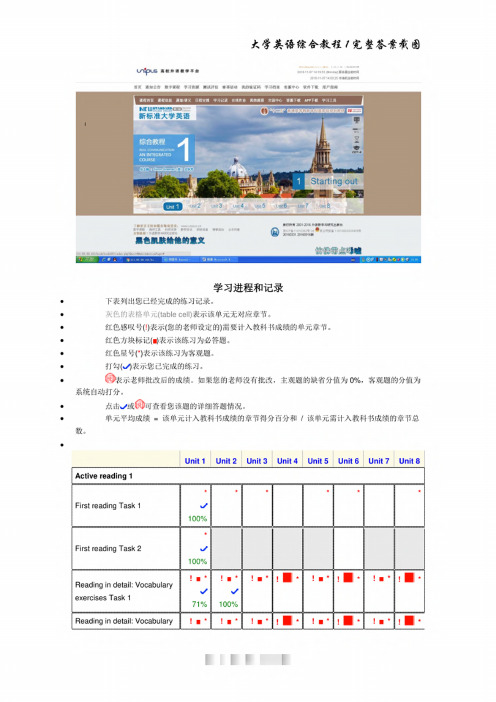
75%
80% ! ..
Reading in detail: VoCabUlary exercises TaSk 4
LangUage in USe TaSk 1
★
★
■*
! ■* ■
■ ! ■ *
! ■* , ,
★
*
! ■ * !> ■.
!■“ ,
■.
■.
I
TaSk 2
★
★
★ ! ■*
TaSk 3
! ■*
I
心 ∖ 3M πw⅜!3 Scpħ⅛. Om ,h∙ a“a,
knows B SOP^gI3N∩g∙gκ∙
伤E H* too Hd Mow⅝d 5
4. NIM Fg¢h⅝fs∙ F* $!udFs can cboo” M
5∙ !M⅛ a WW ■
人名英语徐合残程/竞赛答案我国
♦
入幻 2M.6 .13
ACtiVe reading 1 FirSt reading TaSk 1
Unitl Unit 2 Unit 3 Unit 4 Unit 5 Unit 6 Unit 7 Unit 8
★
★
★
*
★
★
100%
FirSt reading TaSk 2
Reading in detail: VoCabUIary exercises TaSk 1 Reading in detail: VoeabUlary
★
★
Reading in detail: VOCabUlary exercises TaSk 1
Reading in detail: VOCabUlary exercises TaSk 2
- 1、下载文档前请自行甄别文档内容的完整性,平台不提供额外的编辑、内容补充、找答案等附加服务。
- 2、"仅部分预览"的文档,不可在线预览部分如存在完整性等问题,可反馈申请退款(可完整预览的文档不适用该条件!)。
- 3、如文档侵犯您的权益,请联系客服反馈,我们会尽快为您处理(人工客服工作时间:9:00-18:30)。
Translation P25
1. They don’t serve chips / French fries here. If you want it, you have to go to a KFC or McDonald’s.
term)
• 4. He didn’t realize that
• 4. 他没有意识到,对她美 his fascination for her
貌的迷恋使他对她的缺点 beauty had blinded him to
视而不见。(blind v.)
her faults.
• 5. 当得知警察终于在树林 • 5. On hearing that the 里找到她的孩子时,这位 police had finally found
年轻的太太流下了眼泪。 her child in the woods,
(shed)
the young lady shed tears.
Back
Chinese to English
1.人们担心温室效应给环境带来的巨大威胁。(fearful; pose)
People are fearful of the huge threat posed by the greenhouse effect on the environment.
Chinese to English
3. 他渐渐意识到没有人能够对这件事做出一个令人信服的解 释。(dawn on sb; come up with)
It gradually dawned on him that no one would come up with a convincing explanation of this incident.
Chinese to English
4.人们想当然地认为苦干有助于成功。(take for granted; contribute to)
It is taken for granted that hard work contributes to success.
Chinese to English
Back
• Translate the sentences into Chinese.
3. 嫉妒是由懒惰和无知造成的。 Envy is the result of laziness
(the result of …)
and ignorance.
4. 有些大学生是根据自己的专业 来选择志愿服务的,而不是碰 到什么就做什么。(volunteer job; rather than)
• Translate the sentences into
English.
1. 老师很有可能不欣赏不会独立 思考的学生。(not think
much of …; think for oneself)
It is most likely that teachers won’t think much of students who cannot think for themselves.
Translation
Translation P11
1. Their introduction of Amateur Dramatics impressed Sophie so much that she signed up for it.
2. Online education provides those who work full time with opportunities to receive further education in their spare time.
The best approach is to break the students up into several groups so that they can focus their discussion on specific problems.
Back
Chinese to English
5. 最好的办法就是把学生分成若 干小组,让他们针对具体的问 题进行讨论。(break up … into …; focus on)
Rather than picking any volunteer job, some college students choose activities based on their majors.
2. He picked up a walnut and tried to crack it with a hammer, but instead he crushed it.
3. When the gold was heated and melted, they poured it into a mould to form a gold bar.
1. 那位身穿红衬衫的人 突然收起假笑,露出 他的本来面目。 (turn off; false smile; true colours)
• 1. Suddenly the man in the red shirt turned off his false smile and showed his true colours.
• 3. 经理已经做出保证,在 • 3. The manager pledged
他的任期结束之前,他不 his word that he would
会离任。(pledge one’s not leave the office until
word; leave office;
the last day of his term.
• 2. The husband
• 2. 妻子声称丈夫很懒, flatly contradicted
不愿做家务,丈夫对
his wife’s claim that
此予以坚决否认。
he was too lazy to
(flatly; contradict)
do the housework.
Back
Chinese to English
5. 他总是找理由逃避集体活动。(walk away from; collective)
He is finding excuses to walk away from collective activities.
3. When he first arrived at university, he was not sure whether he was supposed to scribble down every word out of the professor’s mouth.
4. Noone detects his despair well hidden behind his smile.
2. 他上中学的时候,几乎没有什 么人去做科学实验,更谈不上 接受这方面的训练了。
(hardly; much less)
When he was in high school, hardly anyone did scientific experiments, much less had training in this respect.
4. He admitted to breaking the window of the classroom.
5. To our delight, the new economic policy is beginning to have a positive effect on the economy.
Chinese to English
2.在大城市里生活一段时间后,他发现自己已经很难再适应 乡村生活了。(be conditioned to)
After living in a big city for a while, he found that it was hard for him to become conditioned to rural life again.
